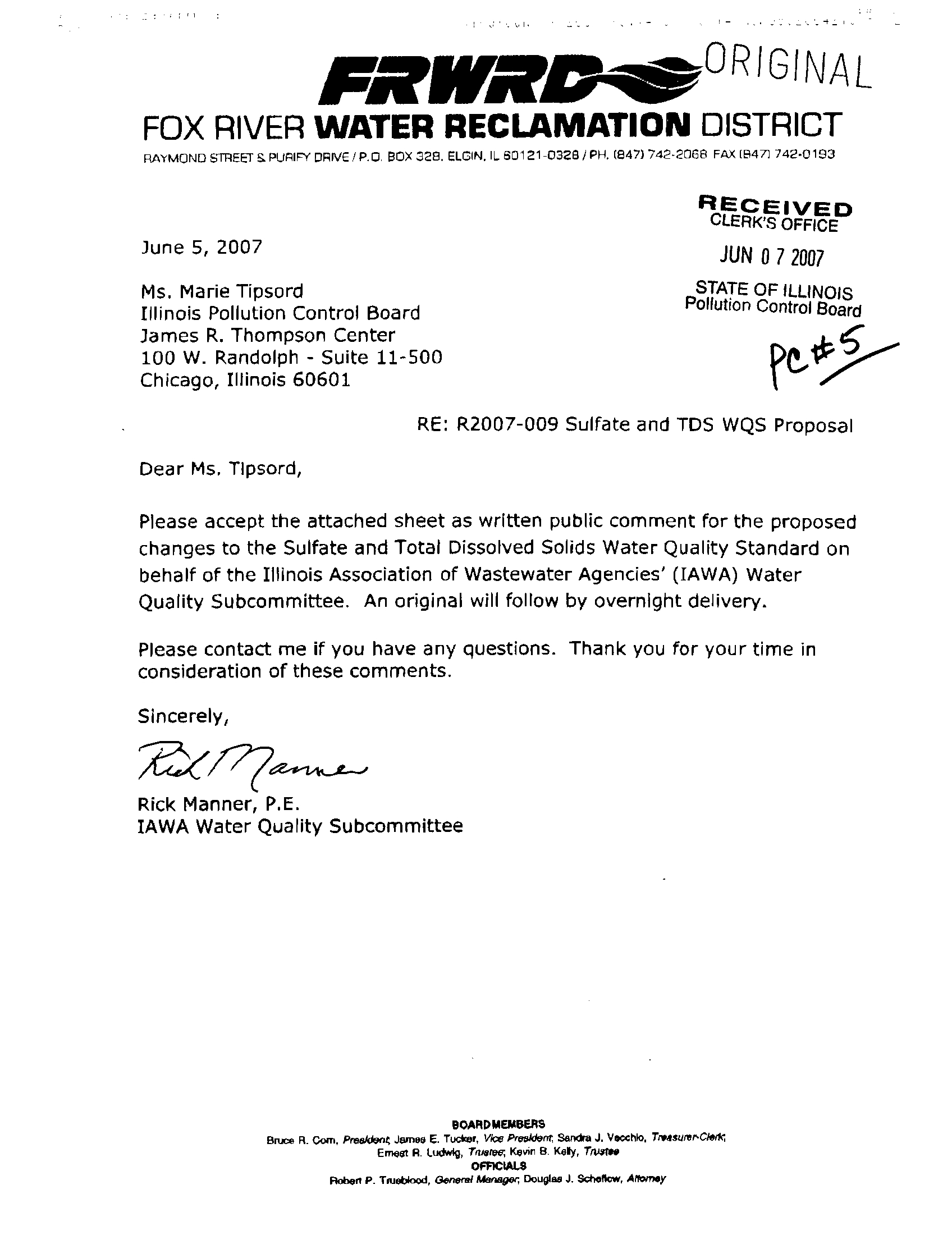~~OR161NqL
FOX RIVER WATER RECLAMATION DISTRICT
RAYMOND STREET & PURIFY DRNE / P.O . BOX
3 28 . ELGIN . I L 50121-0328/ PH
. (847) 742-20G8 FAX (B471 742 .0193
June 5, 2007
Ms
. Marie Tipsord
Illinois Pollution Control Board
James R
. Thompson Center
100 W. Randolph
-
Suite 11-500
Chicago, Illinois 60601
Dear Ms . Tipsord,
Please accept the attached sheet as written public comment for the proposed
changes to the Sulfate and Total Dissolved Solids Water Quality Standard on
behalf of the Illinois Association of Wastewater Agencies' (IAWA) Water
Quality Subcommittee . An original will follow by overnight delivery .
Please contact me if you have any questions
. Thank you for your time in
consideration of these comments
.
Sincerely,
Rick Manner, P .E .
IAWA Water Quality Subcommittee
BOARD MEMBERS
Bruce R . Can, Praeldang
James E. Tucker,
Vlos PrSderrt Sancta J . VsccMo, TnresumrCbnc,
Emest R . Ludwlg, Tmaree;
Kevin B
. Kelly, Tnrst
OFFICIALS
Roben P
. Truedood, General Menage.; Douglas J . Scho low,
Artansy
RE : R2007-009 Sulfate and TDS WQS Proposal
RECEIVED
CLERK'S OFFICE
JUN 0 7 2007
Pollution
STATE OF
Control
ILLINOIS
Board
TRIENNIAL REVIEW OF SULFATE AND TOTAL DISSOLVED SOLIDS WATERCI~IRAL$~ICE
RECEED
STANDARDS :
JUN 0 l 2007
IEPA (Illinois Environmental Protection Agency) should be compliment gT
MEOFILLINOIS
providing a strong scientific basis to a sulfate limit that was acknowled§*kO Lntrol Board
overly simplistic prior to this
. Their work is comprehensive and applicable to the
waters of the state of Illinois
. The proposed changes are supported by the Illinois
Association of Wastewater Agencies (IAWA) Water Quality Subcommittee
.
IEPA should be encouraged to assess and correct other limits that have not been
rigorously reviewed for decades
. Excessively lenient regulations hurt the
environment directly if dischargers exceed what the limit should be
. Excessively
strict limits harm the economy by wasting money in efforts towards monitoring and
control at an unnecessary level
. Such limits also harm the environment indirectly
by wasting natural resources, increasing waste production and/or wasting energy .
In that these indirect damages occur every day, their damage could exceed the
damage caused by any excessively lenient regulations
.
Eliminating the Total Dissolved Solids (TDS) standard is also supported
. Any given
pollutant which is demonstrated to cause damage should be regulated individually
to the extent necessary
. If there is a synergistic or antagonistic effect between
more than one pollutant that is demonstrated to occur in Illinois, that more complex
relationship should be regulated by individual permits or by State regulations
. This
is the case with the proposed limit on sulfate
. However, there is no demonstrable
damage to the environment caused by TDS at the concentrations found in Illinois'
waters
. Retaining the limit would mis-direct compliance efforts towards a standard
that has no rationale for existence .
The use of actual flow values for discharges that only occur during precipitation
events is strongly supported
. This recognizes reality and is protective of the
environment .
IEPA's retaining discretion for when their staff should use a particular dilution value
is also supported
. It is impossible to account for all possible scenarios when writing
regulations
. To attempt to do so would unnecessarily burden the Board and the
regulations with minutiae that would be subject to change at each permit cycle
.
IEPA's professional staff should be trained to enforce explicit standards in most
cases
. They should also be trained to understand the purpose of a regulation and
account for particular circumstances in selected situations
. This is appropriately
their responsibility and they should retain the authority to apply appropriate
discretion .
IEPA's decision to not propose standards for extremely high levels of sulfate and
hardness is an appropriate decision
. Similarly, not analyzing every possible
combination of pollutants and every possible synergistic effect of pollutants is also
appropriate
. These decisions properly conserve staff and research efforts, as well
as Pollution Control Board time for realistic situations for the State of Illinois
.
Fi1Wffl?
~s`
oRfGINAL
FOX
RAYMOND STREET
RIVER
d PURIFY DRIVE/
WATER
P .O
. BOX 328, ELGIN,
RECLAMATION
IL 60121-0328 / PH . [8471 742-2066
DISTRICT
FAX [84?) 742-D193
~ALiT}' ,S,~tfC~ ..~crT.taF
THIS IS PAGE 1 OF 3 PAGES
BEING TRANSMITTED
. IF
ANY PROBLEMS OCCUR, PLEASE CALL (847) 742-2068
.
SOAROMEMSERS
Bruce A . Cum .
Hesidenr, Jemea E Tucker, Vice President, Sandra J. Vecchio. TreasurerClerk
Ernesl R . Lu6mg . Tmeree ; Kevin B
. Kelly
. Trustee
OFFICIAL$
Poberl P . Trueblood, General Manager,
Douglas J . Schellow, Allomey
TELECOPIER COVER PAGE
RECEIVEDCLERK'S
OFFICE
FAX NO, (847) 742-0193
JUN 0 7 2007
To :
Pollution
STATE OF
Control
ILLINOISBoard
JD
I J
~E~'kiAvc-
r
Company :
1
k B
Fax No .
,312 - 6
3~
6
From
:
~t
ct
10
AVua
Date:.
TONE 7, 2p0
7
Time :
3
: 20 P&A,
Re:
gcv tcMAejx,
2007
- 00 7'
SULr
,AT
IC
T-Ds
W,*T -
Q uAcrrv
(7)4n
JD
.9Q-D
Remarks
:
-
T n
nA
cmb~
P,Ger
.fir oam-
i wuo1S 113saclknaq
6r
G~~srGwnrme
AMCAGiCT
A)neX
